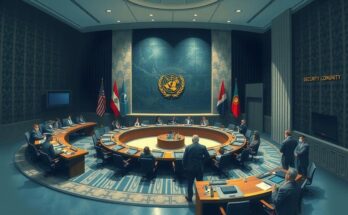The article discusses the escalating militarism in Uganda as a significant threat to peace and stability. It references a report by HURIPEC that examines the integration of military power in governance, citing events that reflect state violence against civilians. The implications for democratic principles and human rights are alarming, suggesting a return to oppressive practices. The urgent need to address militarism to safeguard democracy and citizen rights is emphasized.
In recent discourse, the rising trend of militarism in Uganda has become a topic of significant concern. The Human Rights and Peace Centre (HURIPEC) at Makerere University has published a pivotal report titled ‘GUNS, BREAD AND BUTTER: Militarization of Economic Sectors and Public Institutions in Uganda: A Socio-Legal Analysis.’ This work, authored by Dr. Busingye Kabumba, delves deeply into the implications of militarization within Uganda’s societal structure and governance.
Militarism is articulated in the report as a belief system prioritizing military solutions—including the use of force—as predominant responses to societal challenges. President Yoweri Museveni’s National Resistance Movement (NRM), which has been in power since Uganda’s independence in 1962, has placed the military at the heart of governmental operations, merging state power with military authority.
General Muhoozi Kainerugaba, the army chief and son of President Museveni, addressed the critical role of the military in governance during a recent anniversary of the Tarehe Sita. His speech asserted, “The UPDF and its predecessor… provided the lasting solution to the tyranny, killings and lawlessness that… plagued Uganda.” Such statements starkly contrast with the constitutional principle asserting that power resides with the populace.
Recent acts of military force in Uganda starkly reveal the government’s use of military methods to suppress opposition. Instances in courtrooms where armed security operatives serve as intimidating figures undermine the democratic process. Similarly, violent interventions by masked soldiers against civilians during political rallies represent a disturbing normalization of military presence in civilian life.
The Joint Anti-Terrorism Task Force (JATT), initially established to counter terrorism, has been implicated in human rights violations since its inception in 2002. Reports highlight the force’s practices of wrongful arrests and brutality, with Human Rights Watch indicating that JATT’s operations often occur without legal justification.
The militarization of the police force complicates Uganda’s civil governance, leading to increased violence and erosion of public trust. The HURIPEC report raises alarm as militarization instills fear among the populace while simultaneously motivating some youths to adopt aggressive responses as coping mechanisms.
Historical parallels illustrate a recurring cycle of militarism rooted in Uganda’s colonial legacy and past tyrannical regimes. This reflects a growing unease regarding the possibility of returning to oppressive governance methods, as political narratives evoke concerns reminiscent of past insurgencies.
In conclusion, the current trajectory of militarism poses a substantial threat to Uganda’s peace and stability. The report by HURIPEC emphasizes the urgency of addressing the pervasive militarization within society and governance. If not resolved, the entrenchment of militarism may lead to dire consequences for Uganda’s democratic foundation and its citizens’ human rights.
The article posits that the entrenched militarism within Uganda poses a formidable challenge to the nation’s peace and stability. It highlights the intertwining of military force with governance and the consequent implications for civil rights and public safety. The study underscores the pressing need to combat militarization to preserve democracy and protect the populace’s rights, thereby preventing a descent into a cycle of oppression reminiscent of Uganda’s past.
Original Source: www.independent.co.ug




